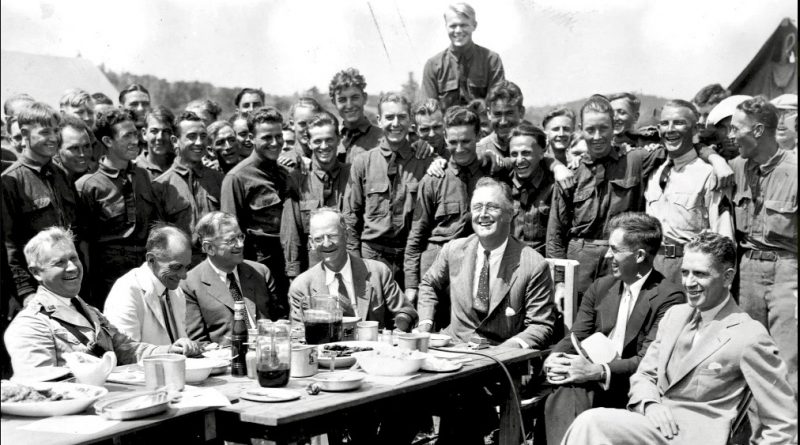Opinion: American Climate Corps: The CCC Reborn

FDR with CCC workers, circa 1934. Photo: Library of Congress
Love, Justice and Climate Change

Last month, the first 9,000 members of the new American Climate Corps were sworn in and started work. This federal program is designed to train young people and engage them in new government-funded jobs in the clean energy, conservation, and climate resilience sectors. It’s modeled on the Civilian Conservation Corps (CCC) that FDR created as part of the New Deal in the 1930’s. I’ve been a supporter of this new Corps since it was first proposed back in 2020.
When I heard that one of my longtime favorite authors, the widely heralded Barbara Kingsolver, had written the pledge that the new Corps members would recite in their swearing-in ceremony, I was intrigued. The text of the pledge touched and charmed me. I wrote this post especially to share the pledge with you.
The Civilian Conservation Corps
In my early 20’s I visited Great Smokey Mountains National Park as both a hiker and as a tourist. I slept in cabins, walked over bridges, and enjoyed spectacular views from overlooks, all of which had small plaques indicating they had been built in the 1930’s by the Civilian Conservation Corps (CCC). Eventually, I learned that the CCC had been one of FDR’s programs to put people into meaningful jobs at government expense in the midst of the economic crisis of the Great Depression. I was impressed that a program created to meet the unemployment crisis decades earlier was still providing the public with so many benefits.
This week I researched just a little of the history of the CCC and learned that they planted a vast number of trees, built thousands of dams, bridges, buildings, water supply systems, and built much of the infrastructure of the U.S. National Park System all over the U.S.
Climate Corps Proposed in 2020
Now we are in a severe climate crisis. Having the government get young people engaged in vital work to respond to the crisis makes a lot of sense to me. The idea was first proposed and pushed during the 2020 presidential campaign by the Sunrise Movement, the youth climate movement that played a key role in building support for the Green New Deal. Massachusetts Senator Ed Markey and Rep. Alexandria Ocasio-Cortez, working with Sunrise, introduced legislation that would fund and create the Climate Corps. The legislation stalled in the Republican controlled Congress.
Hundreds of Sunrise young people visited their Congressional offices, talked to everyone they knew, and put on over 100 rallies and actions in support of a civilian Climate Corps. They led three long marches across the country, blockaded the White House, campaigned for the Corps relentlessly, and built widespread support for the idea. Their skillful, persistent, sustained advocacy and organizing finally made a difference.
Biden Creates Climate Corps by Executive Action
In September of 2023 President Biden took executive action to initiate the American Climate Corps – “a workforce training and service initiative that will ensure more young people have access to the skills-based training necessary for good-paying careers in the clean energy and climate resilience economy.” He committed to putting more than 20,000 to work “conserving and restoring our lands and waters, bolstering community resilience, deploying clean energy, implementing energy efficient technologies, and advancing environmental justice.”
These are a variety of paid positions ranging from a few months to over a year. They are funded through the Inflation Reduction Act and the federal budget. Most are designed to bolster local community efforts–installing clean energy, restoring habitats, weatherizing buildings, instituting climate-resilient farming practices, and more. All involve training and will prepare participants to go on to more permanent jobs in both the private and public sectors that will make a difference in the climate crisis.
Barbara Kingsolver’s Pledge for the Corps
Barbara Kingsolver is excited about the American Climate Corps. She described the pledge she wrote this way: “In less than 100 words, I tried to bring in the most important parts of this initiative — that it’s about respecting and bringing justice to communities, it’s about respecting and honoring the environment and our connection with it, and it’s about taking a part in history.”
Here is the pledge that the first 9,000 members of the American Climate Corps committed to last month. How much of this can we all commit to?
“I pledge to bring my skills, respect, and compassion to work every day, supporting environmental justice in all our communities.
I will honor nature’s beauty and abundance, on which we all depend, and commit to its protection from the climate crisis.
I will build a more resilient future, where every person can thrive.
I will take my place in history, working with shared purpose in the American Climate Corps on behalf of our nation and planet, its people, and all its species, for the better future we hold within our sight.“
Russ Vernon-Jones was principal of Fort River School 1990-2008 and is currently a member of the Steering Committee of Climate Action Now-Western Massachusetts. He blogs regularly on climate justice at www.russvernonjones.org.

Thanks, Russ!! A beautiful pledge:
“I pledge to bring my skills, respect, and compassion to work every day, supporting environmental justice in all our communities.
I will honor nature’s beauty and abundance, on which we all depend, and commit to its protection from the climate crisis.
I will build a more resilient future, where every person can thrive.
I will take my place in history, working with shared purpose in the American Climate Corps on behalf of our nation and planet, its people, and all its species, for the better future we hold within our sight.“